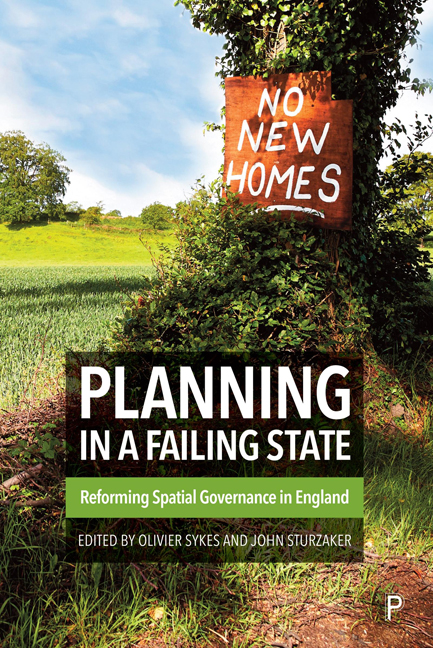Book contents
- Frontmatter
- Dedication
- Contents
- List of figures and tables
- Notes on contributors
- Acknowledgements
- 1 Introduction
- 2 The (housing) numbers game
- 3 Localism: the peccadillos of a panacea
- 4 Planning at the ‘larger than local’ scale: where next?
- 5 PD games: death comes to planning
- 6 Building beauty? Place and housing quality in the planning agenda
- 7 Zoning in or zoning out? Lessons from Europe
- 8 Planning and the environment in England, 2010–22: cutting ‘green crap’, Brexit and environmental crises
- 9 Stuck on infrastructure? Planning for the transformative effects of transport infrastructure
- 10 Conclusion
- Index
4 - Planning at the ‘larger than local’ scale: where next?
Published online by Cambridge University Press: 27 March 2024
- Frontmatter
- Dedication
- Contents
- List of figures and tables
- Notes on contributors
- Acknowledgements
- 1 Introduction
- 2 The (housing) numbers game
- 3 Localism: the peccadillos of a panacea
- 4 Planning at the ‘larger than local’ scale: where next?
- 5 PD games: death comes to planning
- 6 Building beauty? Place and housing quality in the planning agenda
- 7 Zoning in or zoning out? Lessons from Europe
- 8 Planning and the environment in England, 2010–22: cutting ‘green crap’, Brexit and environmental crises
- 9 Stuck on infrastructure? Planning for the transformative effects of transport infrastructure
- 10 Conclusion
- Index
Summary
Introduction
The last century of English sub-national (that is, regional) planning has been defined by two core themes. The first theme is that there is a persistent North–South divide (Dorling, 2010) that has fairly consistently been characterised by an overperforming South East and an underperforming Northern England. This first began to emerge as a serious spatial issue in the 1930s, when Northern industrial areas did not emerge from the Great Depression at the same rate as others. The second is the persistent, if varied, efforts to close that divide, which have appeared on a semi-regular basis across the last century or so.
There are some common characteristics as to how this issue has been approached. For one, successive governments have been consistent in diagnosing the problem. From the Barlow Report of 1940 (Barlow, 1940) and the Redcliffe-Maud Report of 1966 (Wise, 1969), through John Major’s government office regions and John Prescott’s Northern Way in the 1990s (The Northern Way, 2004; Goodchild and Hickman, 2006; Taylor et al, 2010), to the Northern Powerhouse and levelling up discussed in this chapter, all have recognised sclerotic growth away from London and have in some form advocated for a ‘regional’ form of governance to sit between the ‘local’ and the ‘state’. Yet, unlike other national contexts with perhaps more settled subnational structures (Desjardins and Géneau de Lamarlière, 2016; Demazière and Sykes, 2019), British ‘regionalism’ is not stable. Rather, over the decades, regional and metropolitan thinking has fallen in and out of favour, and the recent (that is, post-2010) sub-national environment is as much characterised by the introduction of ‘new’ forms of governance as by their subsequent abolition and a retrenchment towards centralisation (Sturzaker and Nurse, 2020). Ultimately, therefore, the thing that unites most forays into British regionalism is: (1) that they are short-lived; and (2) that, thus far, no scheme can claim success in solving one of British planning’s grandest and long-running challenges.
This chapter explores the latest forays into this field undertaken by the Conservative-led governments of the 2010s and early 2020s. It first charts the abolition of regional governance in 2010 and its gradual replacement with city-region-focused combined authorities and subsequently democratically elected ‘metro mayors’ to lead those constructs.
- Type
- Chapter
- Information
- Planning in a Failing StateReforming Spatial Governance in England, pp. 56 - 71Publisher: Bristol University PressPrint publication year: 2023

